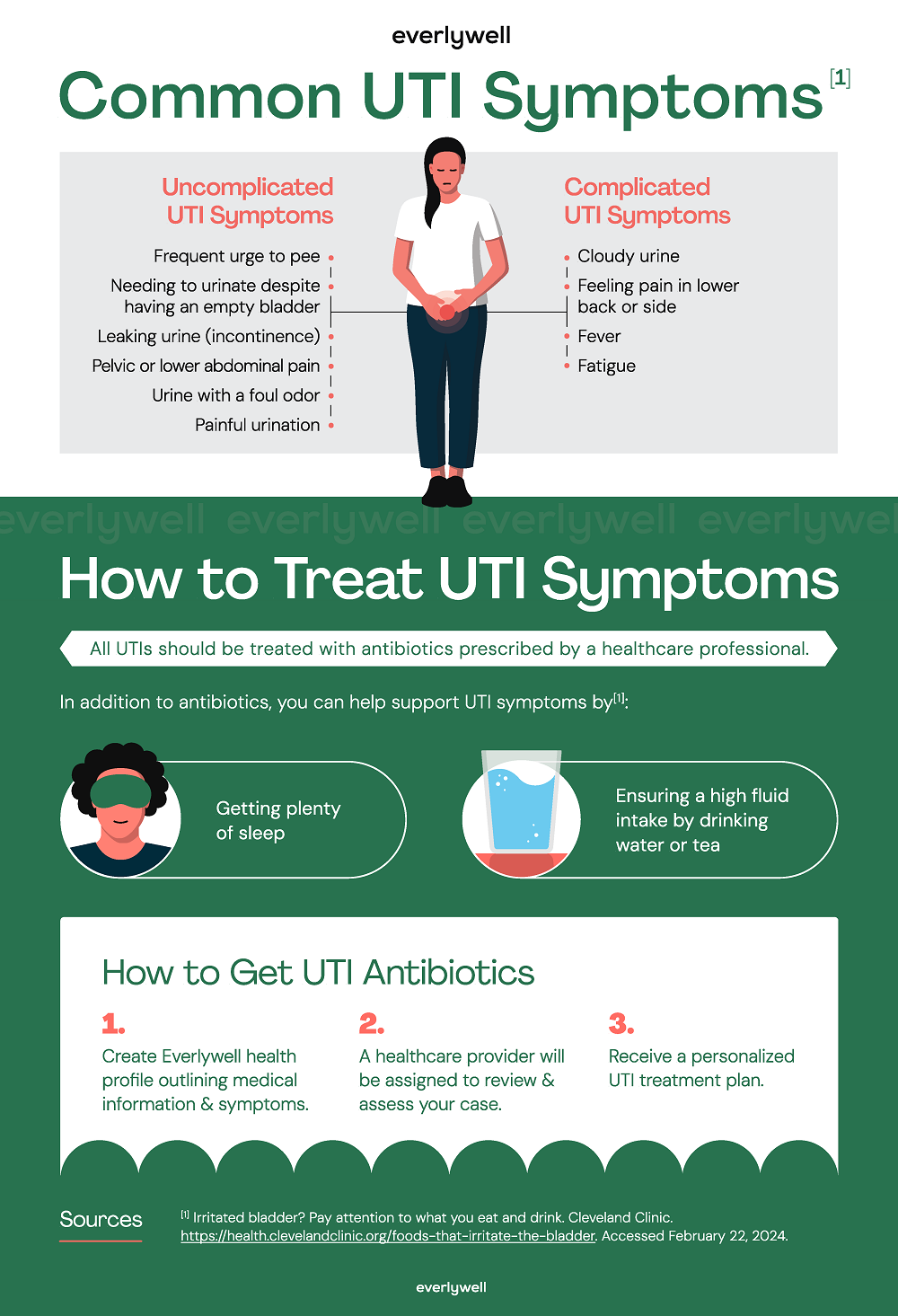
How to Get Rid of a UTI in 24 Hours Without Medication?
Updated March 12, 2024. Medically reviewed on Dec 22, 2022 by Amy Harris, MS, RN, CNM. To give you technically accurate, evidence-based information, content published on the Everlywell blog is reviewed by credentialed professionals with expertise in medical and bioscience fields.
Table of contents
- The Importance of Correctly Diagnosing a UTI
- Can You Treat a UTI Without Medication?
- Home Remedies for UTIs
- What Happens If I Don’t Treat My UTI?
- Evaluate Your UTI with Everlywell
As anyone who has had one knows, a urinary tract infection (UTI), is not very enjoyable. However, they are common, and while they mostly impact women and people assigned female at birth (AFAB), anyone can get one. [1] Scheduling an appointment with a healthcare provider to treat a UTI can be time-consuming and expensive, but the good news is we’re here to discuss how to get rid of a UTI fast.
Although many UTIs resolve on their own, antibiotics can be a quick-acting, highly effective UTI treatment if you need relief faster. Even still, it’s important to obtain a prescription from a virtual or in-person healthcare provider to help ensure you aren’t using antibiotics incorrectly or unnecessarily.
If you’re hoping to learn how to get rid of a UTI in 24 hours, keep reading. Below, we’ll walk through some UTI basics, as well as tips for finding UTI relief while you recover as quickly as possible.
The Importance of Correctly Diagnosing a UTI
Most UTIs are caused by the bacterium E. coli, a bacteria that lives in your body. [2] E. coli enter your urinary tract through the urethra, the tube that drains urine from your bladder.
Because of their anatomy, people with vaginas are more likely to develop a UTI—their urethras are situated closer to their vagina and anus, which are natural habitats for E. coli in the body. [2]
UTI symptoms tend to be quite consistent, though they can vary depending on who has one and how severe the infection is. An untreated lower UTI can progress to an upper UTI, leading to more severe complications. In complicated UTI cases, such as those involving a structural abnormality or kidney stone, the treatment approach may differ from an uncomplicated urinary tract infection.
Healthcare providers recognize these symptoms as some of the most common [2]:
- Having the urge to pee frequently
- Peeing very little when you use the bathroom, despite feelings of urinary urgency
- Leaking urine (incontinence)
- Painful urination
- Feeling pain in your side or lower back
- Fever
- Fatigue
- Pressure in your lower belly
- Pelvic or abdominal pain
- Urine with a foul odor
- Cloudy or reddish urine
Many common UTI symptoms (e.g. increased urination frequency; burning or painful urination) can mimic those of STIs, especially in people with penises. [3] If you think you may have a UTI, it may also be wise to screen for STIs to rule out the possibility of a different kind of infection.

What Are Recurring UTIs?
UTI symptoms can also come and go, which may cause people to mistakenly believe the infection has resolved on its own. Recurrent or recurring UTIs are defined as [4]:
- Any UTI that occurs within 6 months of the last infection
- Having 3 or more UTIs in a single year
Between 40 and 60% of women and people AFAB will get a UTI at some point in their lifetime, and 1 in 4 will develop a recurrent urinary tract infection. [1]
If you notice your UTIs keep coming back, it’s important to consult with a healthcare provider to ensure you’re properly treated while minimizing your chances of antibiotic resistance.
Can You Treat a UTI Without Medication?
Like other types of infections, most healthcare providers prescribe antibiotic medication to correct a UTI. But can you get rid of UTI without antibiotics?
Sometimes. This is because not all UTIs require antibiotic treatment [5].
For instance, the treatment for asymptomatic bacteriuria, a type of UTI that occurs with no symptoms, may simply be waiting for your immune system to take care of the infection. [5]
Symptomatic UTIs, though, typically require antibiotic medication to treat. When UTIs remain untreated, they can travel deeper into the urinary system and even result in a kidney infection (pyelonephritis). [6] Antibiotics help to ensure the infection doesn’t get worse.
Likewise, some people may need antibiotics to take care of a UTI, such as [5]:
- Pregnant people
- Immunocompromised people
- People scheduled to have urologic surgery
If you’re experiencing symptoms of a UTI, it’s important to consult with a healthcare provider or telehealth professional to obtain a prescription. Fortunately, several home remedies may help you find symptom relief while you wait for your medicine and immune system to combat the infection together.
Home Remedies for UTIs
While only antibiotics will get rid of a UTI fast, the following suggestions may help you feel better while you wait for the antibiotics to resolve the infection.
Boost Your Sleep
Antibiotics for UTIs work by lowering the defenses of the harmful bacteria creating the infection, allowing your immune system to dispel it from your infected urinary organs. As with other infections and illnesses, getting more rest may help support your immune system in fighting infection.
Boost Your Fluid Intake
Taking in more fluids helps to dilute urine, making it easier for harmful bacteria to exit the urinary system [6]. However, it’s important to focus on water and herbal teas, as opposed to [7]:
- Coffee
- Alcohol
- Sodas
- Citrus juices
- Sugary juices
- Energy drinks
- Caffeinated teas
These drinks can have a dehydrating effect and may cause more irritation to your UTI symptoms.
Try an OTC Medication
While UTI antibiotics help take care of the infection itself, some OTC (over-the-counter) painkillers may help you find symptom relief. For UTI pain, you might try:
- Acetaminophen (Tylenol)
- Ibuprofen and NSAIDs (Advil)
- Phenazopyridine hydrochloride (AZO or Uristat)
Will Drinking Cranberry Juice Help a UTI?
This is a prevalent myth, but there’s no concrete research to suggest that UTIs (no matter how mild) respond to cranberry juice.
According to the National Center for Complementary and Integrative Health (NCCIH), there is no evidence showing that home remedies such as cranberries, cranberry juice, or cranberry supplements can treat UTIs. [8] However, the NCCIH suggests regularly drinking cranberry juice may reduce the risk of a recurrent UTI in people who have had them before. [8]
With that, there’s no reason why you can’t enjoy cranberry juice when you’re recovering from a UTI. However, the bottom line is that if you think you have a UTI, you should see a healthcare provider for diagnosis and antibiotic treatment.
What Happens If I Don’t Treat My UTI?
Neglecting to treat your UTI can put you at risk of a kidney infection, or pyelonephritis. [9] This can occur when an infection of the urethra or bladder travels deeper into the urinary system. [9]
Symptoms of a kidney infection include [9]:
- Fever
- Chills
- Lower back pain or pain in the side of your back
- Nausea or vomiting
In some cases, pyelonephritis can develop rapidly from an untreated UTI. This can cause the kidneys to swell, which puts you at risk of permanent kidney damage. [9]
Evaluate Your UTI with Everlywell
If you need to treat a UTI fast but don’t want to visit a healthcare provider in person, consider booking a virtual appointment with a telehealthcare professional. Everlywell links you to vetted providers, making diagnosing your condition and securing a prescription convenient and cost-effective.
With Everlywell, you can also narrow down the root cause of your symptoms by taking an at-home STI test. Screen for 6 of the most commonly transmitted infections with CLIA-certified, physician-reviewed results you can rely on. Or, use our virtual care services to meet with a licensed clinician to receive UTI treatment online.
No matter your health concern, Everlywell can connect you with the resources you need to get treated faster. Check out more by visiting Everlywell online today.
Sources
- Urinary tract infections. Office on Women’s Health. (n.d.). Medical Citation URL. Accessed February 22, 2024.
- Urinary Tract Infections. Cleveland Clinic. Medical Citation URL. Accessed February 22, 2024.
- Sexually Transmitted Disease (STD) Symptoms. Mayo Clinic. Medical Citation URL. Accessed February 22, 2024.
- Aggarwal, N. (2024, January 11). Recurrent urinary tract infections. StatPearls [Internet]. Medical Citation URL.
- Mayo Clinic Q and a: 6 uti myths and fact. Mayo Foundation for Medical Education and Research. Medical Citation URL. Accessed February 22, 2024.
- Urinary Tract Infections (UTIs). Mayo Clinic. Medical Citation URL. Accessed February 22, 2024.
- Irritated bladder? pay attention to what you eat and drink. Cleveland Clinic. Medical Citation URL. Accessed February 22, 2024.
- Cranberry. National Center for Complementary and Integrative Health. Medical Citation URL. Accessed February 22, 2024.
- Kidney Infection (Pyelonephritis). Cleveland Clinic. Medical Citation URL. Accessed February 22, 2024.
Amy Harris, MS, RN, CNM has a master's degree in Maternal and Child Health from Harvard T. Chan School of Public Health. She attended Yale School of Nursing and Boston University School of Public Health to become a certified nurse midwife (CNM). She has worked for over 20 years in clinical and public health practice and has published in scientific publications such as the Journal of Midwifery and Women's Health. She specializes in women's reproductive health care, healthy literacy, and writing about health and wellness.